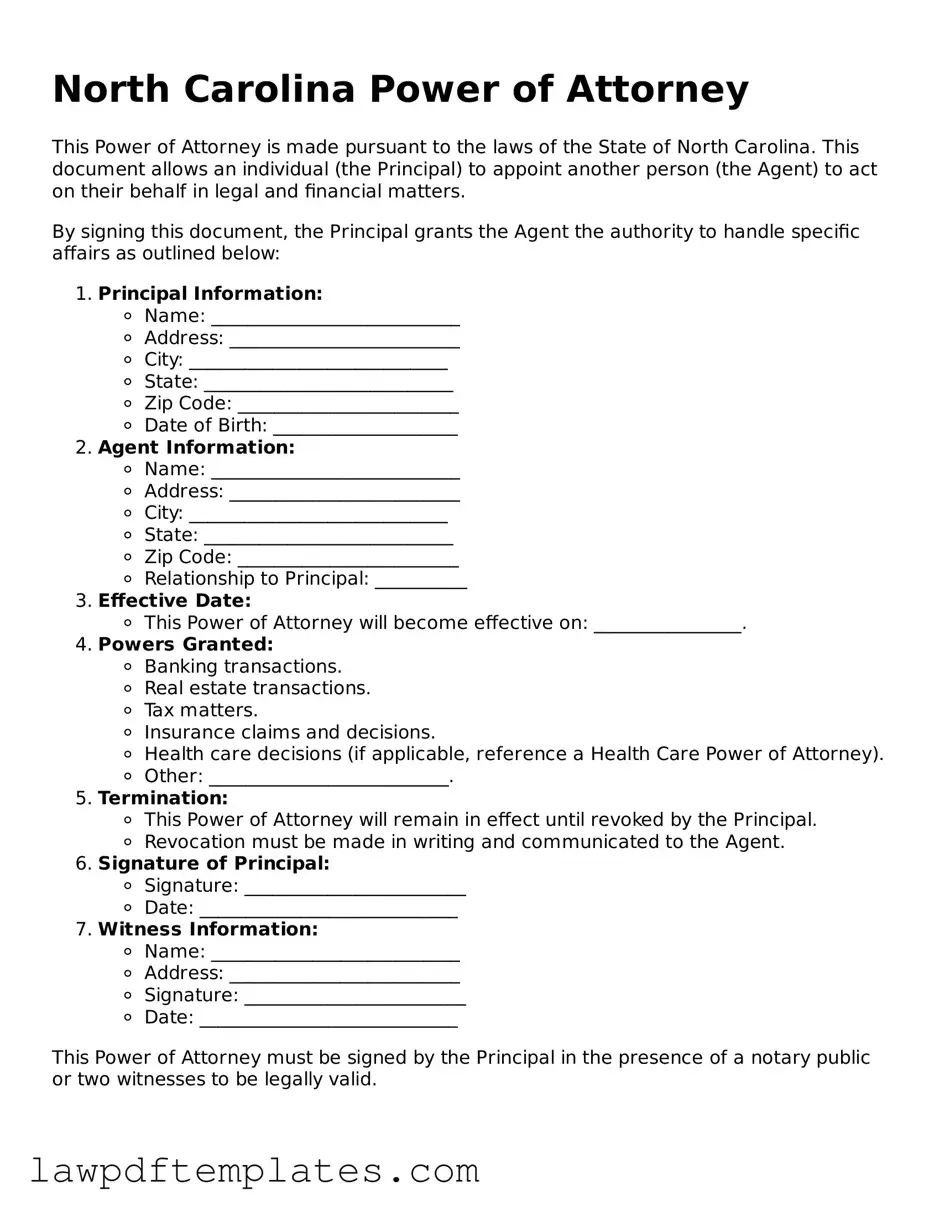Free Power of Attorney Template for the State of North Carolina
Form Breakdown
| Fact Name | Description |
|---|---|
| Definition | A Power of Attorney (POA) allows one person to make decisions on behalf of another. |
| Governing Law | The North Carolina Power of Attorney is governed by Chapter 32C of the North Carolina General Statutes. |
| Types | There are different types of POAs, including General, Limited, and Durable POAs. |
| Durability | A Durable Power of Attorney remains effective even if the principal becomes incapacitated. |
| Agent Authority | The agent can handle financial matters, medical decisions, or other specific tasks as outlined in the document. |
| Revocation | The principal can revoke the Power of Attorney at any time, as long as they are mentally competent. |
| Signing Requirements | The form must be signed by the principal and witnessed by at least one person or notarized. |
| Legal Advice | It is recommended to seek legal advice when creating or modifying a Power of Attorney. |
Sample - North Carolina Power of Attorney Form
North Carolina Power of Attorney
This Power of Attorney is made pursuant to the laws of the State of North Carolina. This document allows an individual (the Principal) to appoint another person (the Agent) to act on their behalf in legal and financial matters.
By signing this document, the Principal grants the Agent the authority to handle specific affairs as outlined below:
- Principal Information:
- Name: ___________________________
- Address: _________________________
- City: ____________________________
- State: ___________________________
- Zip Code: ________________________
- Date of Birth: ____________________
- Agent Information:
- Name: ___________________________
- Address: _________________________
- City: ____________________________
- State: ___________________________
- Zip Code: ________________________
- Relationship to Principal: __________
- Effective Date:
- This Power of Attorney will become effective on: ________________.
- Powers Granted:
- Banking transactions.
- Real estate transactions.
- Tax matters.
- Insurance claims and decisions.
- Health care decisions (if applicable, reference a Health Care Power of Attorney).
- Other: __________________________.
- Termination:
- This Power of Attorney will remain in effect until revoked by the Principal.
- Revocation must be made in writing and communicated to the Agent.
- Signature of Principal:
- Signature: ________________________
- Date: ____________________________
- Witness Information:
- Name: ___________________________
- Address: _________________________
- Signature: ________________________
- Date: ____________________________
This Power of Attorney must be signed by the Principal in the presence of a notary public or two witnesses to be legally valid.
Common mistakes
Filling out the North Carolina Power of Attorney form can be a straightforward process, but many individuals make common mistakes that can lead to complications. One frequent error is failing to clearly identify the principal and the agent. It is essential to provide complete names and addresses. Incomplete information can create confusion about who has the authority to act on behalf of the principal.
Another common mistake is not specifying the powers granted to the agent. The form allows for broad or limited powers, and it is crucial to clearly outline what the agent can and cannot do. Vague language can lead to misunderstandings and potential disputes later on.
Many people overlook the importance of signatures. The principal must sign the document, and if the agent is also required to sign, that must be done as well. Additionally, failing to date the form can lead to questions about its validity. Each signature should be accompanied by the date to ensure clarity regarding when the document was executed.
Witness requirements are often misunderstood. In North Carolina, the Power of Attorney must be signed in the presence of a notary public. Some individuals neglect to have the document notarized, which can render it ineffective. Ensuring that a notary is present during the signing process is a critical step that should not be overlooked.
Another mistake involves not updating the Power of Attorney when circumstances change. Life events such as marriage, divorce, or the death of the agent can affect the validity of the document. It is important to review and, if necessary, revise the Power of Attorney to reflect current situations.
Some people fail to provide copies of the signed document to relevant parties. Once the Power of Attorney is executed, the principal should share copies with the agent, financial institutions, and any other entities that may need to recognize the agent's authority. Without proper distribution, the agent may encounter obstacles when attempting to act on behalf of the principal.
Additionally, neglecting to consider the implications of granting powers can lead to issues. The principal should fully understand the responsibilities and potential risks associated with the powers being granted. This understanding is crucial to avoid future conflicts or misuse of authority.
Another error is using outdated forms. Legal documents can change over time, and using an old version of the Power of Attorney form may not comply with current laws. It is advisable to obtain the most recent version to ensure that all legal requirements are met.
Finally, people sometimes assume that a Power of Attorney is a one-time document. In reality, it may need to be revoked or replaced as circumstances evolve. Regularly reviewing the document and making necessary changes is essential for maintaining its effectiveness.
Discover More Power of Attorney Templates for Specific States
Printable Power of Attorney Form Nj - This form can act as a crucial tool in navigating financial scenarios, securing one's interests effectively.
For those seeking clarity in their rental agreements, understanding the essential aspects of a Residential Lease Agreement is crucial. You can find a comprehensive guide by visiting the important Residential Lease Agreement form overview.
Massachusetts Power of Attorney - This form requires your signature and possibly a witness or notary.
